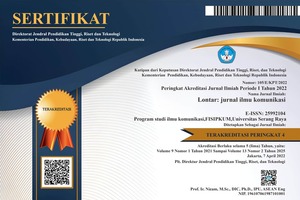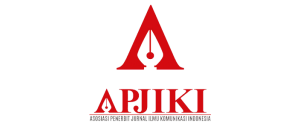Digital Literacy of Tourism Awareness Groups in Digital Promotion Activities of Cibuntu Tourism Village, Kuningan Regency
DOI:
https://doi.org/10.30656/lontar.v12i1.8505Keywords:
Digital Literacy, Digital Promotion, Pokdarwis, Tourism Village.Abstract
Cubuntu tourist village in Kuningan Regency is an outstanding tourist village actively participating in digital promotion. The success of digital tourism promotion is closely related to the digital literacy skills of tourist village managers. This study aims to analyze the digital literacy of the Cibuntu village tourism awareness group (Pokdarwis) in digital promotion activities. The research method used is qualitative with a case study design. Data were obtained from interviews with four members of the Pokdarwis of Cibuntu village in the field of promotional media and observation of the Cibuntu village promotional media. The results showed that the digital literacy of Pokdarwis Cibuntu village has various aspects of digital skills, including information literacy, communication, and collaboration skills, the ability to develop digital content creation, and the ability to secure digital data. Meanwhile, the ability to solve problems using digital technology has not been able to be done, and the ability to create digital content has been done, but not entirely. The contribution of this research shows that the digital literacy skills possessed by the Pokdarwis of Cibuntu village are learned independently through content on social media. The findings are a consideration for tourism village managers in other regions to encourage Pokdarwis members to learn independently about digital promotion activities amid the wealth of information on social media.
References
Cresswell, J. W., & Poth, C. N. (2018). Qualitative Inquiry & Research Design (Fourth). Sage Publication.
Cuic Tankovic, A., Kapeš, J., & Benazić, D. (2023). Measuring the importance of communication skills in tourism. Economic Research-Ekonomska Istrazivanja , 36(1), 460–479. https://doi.org/10.1080/1331677X.2022.2077790
Fransisca, M. (2021). Komunikasi Pemasaran dalam Meningkatkan Kunjungan Wisatawan (Studi Kasus pada Kelompok Penggerak Pariwisata (Kompepar) Kabupaten Kuningan). Jurnal Signal, 9(1), 2337–4454.
Gilster, P. (1997). Digital Literacy. John Wiley & Sons, Inc.
Kartika, T., Afriza, L., Fajri, K., Pemberdayaan, :, Di, M., Wisata, D., Kabupaten, C., Provinsi, K., Barat, J., Stiepar, ), & Bandung, Y. (2019). Pemberdayaan Masyarakat Di Desa Wisata Cibuntu Kabupaten Kuningan Provinsi Jawa Barat. Journal of Indonesian Tourism, Hospitality and Recreation, 2(1).
Kurnianti, A. W. (2018). Strategi Komunikasi Pemasaran Digital sebagai Penggerak Desa Wisata Kabupaten Wonosobo Provinsi Jawa Tengah. Jurnal Riset Komunikasi, 1(1), 180–190.
Law, Nancy. , David Woo, & Jimmy de la Torre and Gary Won. (2018). A Global Framework of Reference on Digital Literacy Skills for Indicator 4.4.2. Information Paper No. 51. http://www.uis.unesco.org
Margaretha, S., Restaty, N., Eka, A. G., Wuryanta, W., Info, A., Mercu, U., Jakarta, B., Meruya, J., & Jakarta, S. (2022). Digital Media Literacy And Social Media Competence Among Millennials For Tourism Promotion During The Covid Pandemic. Jurnal Ilmu Komunikasi, 11(2), 130–143.
Meyers, E. M., Erickson, I., & Small, R. V. (2013). Digital literacy and informal learning environments: An introduction. Learning, Media and Technology, 38(4), 355–367. https://doi.org/10.1080/17439884.2013.783597
Miles, M. B., Huberman, A. M., & Saldana, J. (2014). Qualitative Data Analysis (3rd ed.). SAGE Publications, Inc.
Nugroho, C. (2020). Cyber Society : Teknologi, Media Baru, dan Disrupsi Informasi . Kencana Media Group.
Nur, A., Mukhamad, A., Ma’mun Sarma, N., Leong, Y. C., & Afifah, A. N. (2018). Digital Marketing Adoption and The Inflences Towards Business Successes Of MSMEs Creative Sector In Indonesia and Malaysia. Journal of Applied Management (JAM), 16. https://doi.org/10.21776/ub.jam.2018
Patton, M. Q. (2015). Michael Quinn Patton - Qualitative Research & Evaluation Methods_ Integrating Theory and Practice-Sage Publications, Inc (2014) (Fourth Edition).
Pratama, Y., Sinaga, A. M., Sianturi, R. A., & Situmorang, V. (2021). Literasi Media Digital Pada Komunitas Pariwisata di Kawasan Danau Toba. JUMPA, 8(1).
Puspitasari, Y., Pambuko, A. B., Muliawanti, B., Fidiand, C., & Magelang, M. (2022). Literasi Media Sosial Penggiat Desa Wisata Wanurejo, Borobudur: Apakah Usia Penting? CHANNEL: Jurnal Komunikasi, 10(2), 2621–2579. www.onlinedoctranslator.com
Ritonga, A. K. (2023). An Analysis of English for Tourism, Digital Literacy, and Business Success to A Tourist Destination Promotion. Jurnal Iqra’ : Kajian Ilmu Pendidikan, 8(2), 325–339. http://journal.iaimnumetrolampung.ac.id/index.php/ji/
Supriatna, T., Juhandi, D., & Rasipan, R. (2022). Promosi Media Sosial dan Literasi Digital Terhadap Kinerja Pemasaran yang di Moderasi Akses Fasilitas Digital. MASTER: Jurnal Manajemen Strategik Kewirausahaan, 2(2), 167–178. https://doi.org/10.37366/master.v2i2.481
Syah, F., Syafganti, I., & Muharram, A. T. (2021). Komunikasi Pemasaran Pariwisata Desa Wisata Subang. Jurnal Lugas, 5(2), 73–82.
Windyaningrum, R., Kusumawindarti, N., Rubyasih, A., Made, S., & Koesanto, A. A. (2023). Model Keterampilan Literasi Digital pada Aparatur Desa dan Kelompok Masyarakat di Kabupaten Bandung Digital Literacy Skill Model In Village Apparatus and Community Group In Bandung District. Anterior Jurnal, 22(1), 12–20. http://journal.umpalangkaraya.ac.id/index.php/anterior
Wirdayanti, A., Amanah, A., Anggono, B. D., Hartoyo, D. R., & Indarty, E. (2021). Pedoman Desa Wisata. Kementerian Koordinasi Bidang Kemaritiman dan Investasi.
Downloads
Published
Issue
Section
License
By submitting an article to the journal, the author(s) agree to transfer the published article's copyright to the journal, which will act as the publisher. This means the journal will have the right to publish the article in various forms, including reprints. The journal will maintain the publishing rights to the published articles.
In line with the license, authors and third parties (readers, researchers, and others) are allowed to share and adapt the material. In addition, the material must be given appropriate credit, provided with a link to the license, and indicated if changes were made. If authors remix, transform, or build upon the material, authors must distribute their contributions under the same license as the original.





